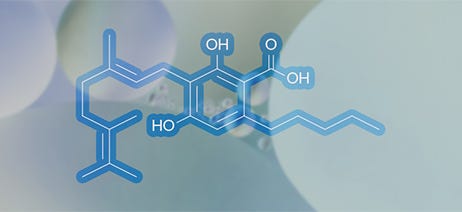
What is Cannabigerolic Acid (CBGA)?
Spoiler alert: if you’ve already read our guide about CBG, chances are, you’ve heard about CBGA. In this guide, we’ll dive in deeper to this unique cannabinoid acid and explain:
- What is CBGA?
- What Does CBGA Do and How Does it Work?
- What’s the Difference Between CBG and CBGA?
- CBGA FAQs
What is CBGA?
CBGA, or cannabigerolic acid, is considered and frequently referred to as the “mother cannabinoid.” This is because CBGA is the building block for cannabinoids like:
And why, you might ask, are some of these cannabinoids important? THCA and CBDA, when decarboxylated, become the two most well-known cannabinoids: THC and CBD. CBGA also has an important role to play in the cannabis plant by helping to push resources into the flowers of the plant. To do this, CBGA aids in programmed cell death within the leaves of the plant. This process maximizes the plant’s energy to produce both resin and seeds.
What Does CBGA Do and How Does It Work?
As with many cannabinoids, determining what CBGA does and how it works is a bit up in the air. Researchers are only just starting to study cannabinoids, how they work in the human body, and how they may be able to aid the endocannabinoid system in maintaining homeostasis.
What we can be fairly certain of is that CBGA is another cannabinoid that contributes to the entourage effect—though this is highly dependent on how you consume CBGA. (Remember, if you heat your cannabis, you will decarboxylate the CBGA, and it will become a different type of cannabinoid.)
Beyond this, there have been some animal studies that show CBGA has an impact on intestines, metabolism, and nerve cells. However, more work needs to be done to truly understand CBGA.
What’s the Difference Between CBG and CBGA?
Because CBGA is a mother cannabinoid, you can’t have CBG without CBGA. If you vape or otherwise heat your cannabis, you are helping CBGA to turn into CBG (and a variety of other cannabinoids). Therefore, it’s harder to experience CBGA without consuming raw cannabis.
CBGA FAQs
Is CBGA in CBD oil?
No. To make CBD, cannabis cultivators have to decarboxylate CBDA. This process will also decarboxylate any trace amounts of CBGA, ensuring there isn’t any CBGA in the final product.
Is CBGA a cannabinoid?
Yes, CBGA is a cannabinoid. In fact, you wouldn’t have many of the most popular cannabinoids, like THC and CBD, without CBGA.
Where Can You Find CBGA?
CBGA can be found in a variety of products at your local dispensary, including concentrates, isolates, and tinctures.


